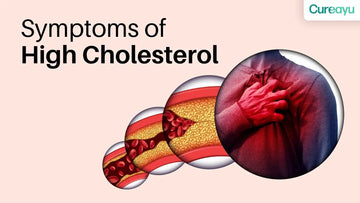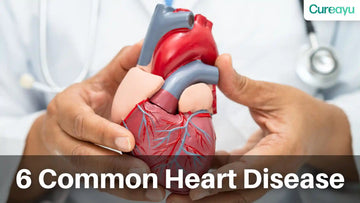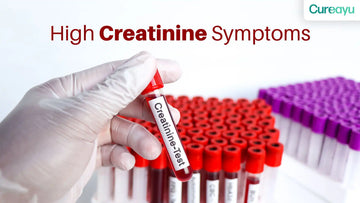When we talk about health, cholesterol is like a character with two sides – it's important for our body, but too much can silently harm our arteries and hearts. Even though it's a big problem, it doesn't always show clear signs. That's why it's super important to notice the small signs of high cholesterol early on to stop it from causing big problems later. High cholesterol can quietly sneak into our blood vessels and cause heart disease or stroke. Understanding this helps us make changes in our lifestyle and get help from doctors to stop it. Learning about this sneaky problem helps us keep our bodies healthy and safe from high cholesterol.
Difference Between LDL & HDL
LDL (Low-Density Lipoprotein): LDL is often called the "bad" cholesterol because it carries cholesterol from the liver to cells, where it can build up in artery walls and cause atherosclerosis, a condition that narrows the arteries. Having high levels of LDL increases the risk of heart disease and stroke.
HDL (High-Density Lipoprotein): HDL is known as the "good" cholesterol because it helps remove cholesterol from the arteries and transports it back to the liver for removal from the body. Higher levels of HDL are associated with a lower risk of heart disease, as it helps to keep the arteries clear and healthy.
Also Read: Protecting Your Heart: Essential Tips for Heart Health
What Happens If Cholesterol Is High
When cholesterol levels are high, it can lead to the buildup of plaque inside the arteries, a condition known as atherosclerosis. This plaque is made up of cholesterol, fats, and other substances. As the plaque accumulates, it narrows the arteries, restricting the flow of blood to vital organs such as the heart and brain. This reduced blood flow can lead to various cardiovascular problems, including chest pain (angina), heart attacks, and strokes. Essentially, high cholesterol sets the stage for a domino effect of health complications by impairing the normal flow of blood throughout the body, putting individuals at increased risk of serious cardiovascular events.
Some Common Symptoms Of High Cholesterol
- Chest Pain (Angina): Also known as angina, chest pain can occur when arteries become narrowed or blocked due to cholesterol buildup, reducing blood flow to the heart. It's often described as a feeling of pressure, squeezing, or tightness in the chest, and may radiate to the shoulders, arms, neck, jaw, or back. Angina can be triggered by physical exertion or emotional stress and typically resolves with rest or medication.
- Leg Pain (Peripheral Artery Disease): Peripheral artery disease caused by cholesterol buildup can lead to leg pain, cramping, or weakness, especially during physical activity. This discomfort, known as claudication, occurs due to reduced blood flow to the muscles in the legs. Claudication typically improves with rest but worsens with continued activity.
- Stroke: A blood clot formed due to cholesterol plaque in the arteries supplying the brain can cause a stroke, leading to symptoms such as sudden numbness or weakness in the face, arm, or leg, especially on one side of the body. Other signs of a stroke may include difficulty speaking, confusion, vision problems, dizziness, or severe headache. Immediate medical attention is crucial to minimize damage and improve outcomes in case of a stroke.
- Yellowish Deposits (Xanthomas): Fatty deposits, called xanthomas, may appear as yellowish bumps under the skin, particularly around the eyes, indicating high cholesterol levels. These deposits typically develop on tendons or ligaments and can vary in size and shape. While not harmful themselves, xanthomas can be a visible indicator of underlying cholesterol abnormalities and should prompt further evaluation by a healthcare provider.
- Grayish-white Rings (Arcus Senilis): Arcus senilis, a grayish-white ring around the cornea, can develop due to cholesterol deposits, especially in individuals over 60 years old. This ring, which may appear as a hazy or cloudy band encircling the outer edge of the iris, is typically harmless and doesn't affect vision. However, it can serve as a marker of elevated cholesterol levels and may warrant cholesterol screening and management to reduce the risk of cardiovascular disease.
Also Read: How to Maintain Normal Blood Pressure for a Healthier Life
How Do You Know If You Have High Cholesterol
Regular lipid profile tests can measure your cholesterol levels. The test provides information about total cholesterol, LDL cholesterol, HDL cholesterol, and triglycerides. It's recommended for adults to have their cholesterol checked at least once every four to six years.
How To Monitor Cholesterol Problems
- Healthy Diet: Adopt a diet rich in fruits, vegetables, whole grains, and lean proteins while limiting saturated fats, trans fats, and cholesterol.
- Regular Exercise: Engage in aerobic exercises such as brisk walking, jogging, cycling, or swimming for at least 150 minutes per week to improve cholesterol levels and overall cardiovascular health.
- Maintain a Healthy Weight: Losing excess weight can help lower LDL cholesterol levels and raise HDL cholesterol levels.
- Avoid Smoking: Smoking damages blood vessels, increases LDL cholesterol levels, and lowers HDL cholesterol levels, significantly raising the risk of heart disease.
- Medication: In cases of significantly high cholesterol levels or individuals at high risk of heart disease, doctors may prescribe cholesterol-lowering medications, such as statins, to manage cholesterol levels effectively.
Also Read: Unraveling Triglycerides: Exploring Their Impact on Health
Treatment For High Cholesterol
Treatment for high cholesterol often involves lifestyle changes, such as adopting a heart-healthy diet, increasing physical activity, and quitting smoking. In addition, medications like statins, cholesterol absorption inhibitors, and PCSK9 inhibitors may be prescribed to lower cholesterol levels and reduce the risk of cardiovascular events.
Conclusion
High cholesterol is a silent but potent risk factor for cardiovascular disease. Recognizing the symptoms and taking proactive steps to manage cholesterol levels through lifestyle modifications and, if necessary, medications, can significantly reduce the risk of heart attacks, strokes, and other cardiovascular complications. Regular monitoring and maintenance of cholesterol levels are essential for maintaining heart health and overall well-being.












